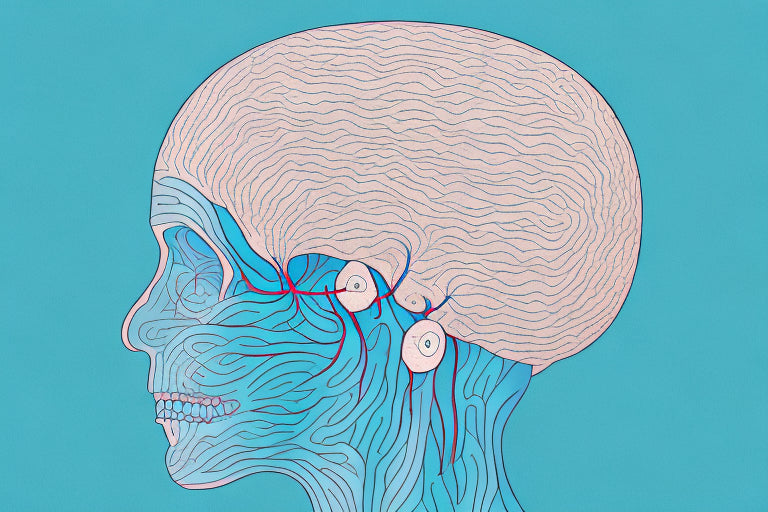Understanding Hair Loss Due to Health Reasons
Posted by MORFOSE COSMETICS

Understanding Hair Loss Due to Health Reasons
Hair loss is a common problem faced by both men and women. Although genetics plays a significant role in determining your hair health, there are various health reasons that can cause hair fall. Understanding these causes is crucial to identify the root cause of the problem and take necessary actions to prevent hair loss.
Causes of Hair Loss Related to Health Issues
Having a full head of hair is something that many people take for granted. However, for some individuals, hair loss can be a source of stress and anxiety. Hair loss can be attributed to various factors, including genetics, age, and health issues. In this article, we will explore some of the health issues that can cause hair loss.
Hormonal Imbalances
Hormones play a crucial role in hair growth. Any changes in the hormone levels can trigger hair loss as well as changes in the texture and thickness of the hair. Hormonal imbalances in the body can lead to hair loss. For instance, women may experience hair fall during pregnancy, menopause, and after discontinuing birth control pills. These changes in the hormone levels can trigger hair loss as well as changes in the texture and thickness of the hair.
During pregnancy, the body produces higher levels of estrogen, which prolongs the growth phase of the hair cycle, resulting in thicker and fuller hair. However, after delivery, the estrogen levels drop, leading to hair loss. Similarly, during menopause, the body produces lower levels of estrogen, leading to hair loss.
Nutritional Deficiencies
A well-balanced diet with essential nutrients, vitamins, and minerals is paramount for good hair health. Deficiencies in vitamins B, C, D, E, and zinc can lead to thinning of hair and hair fall. For example, inadequate intake of vitamins B12 and D can cause hair loss and affect hair regrowth.
Vitamin B12 is essential for the production of red blood cells, which carry oxygen to the hair follicles. Without enough oxygen, hair follicles become weak and can fall out. Vitamin D plays a vital role in hair growth, and its deficiency can lead to hair loss.
Autoimmune Disorders
Autoimmune disorders are conditions where the immune system mistakenly attacks healthy tissues. These disorders can cause hair loss, and alopecia androgenetic are examples of hair loss conditions caused by autoimmune disorders. These conditions lead to hair follicles shrinking, reducing the hair's lifespan and causing baldness.
In alopecia androgenetic, the immune system attacks the hair follicles, leading to hair loss. The condition affects both men and women and can lead to complete baldness.
Infections and Skin Conditions
Infections on the scalp, such as ringworm, cause hair loss. Similarly, skin conditions such as psoriasis, seborrheic dermatitis, and folliculitis can cause hair loss. These conditions also cause scalp inflammation that can lead to hair fall.
Ringworm is a fungal infection that affects the scalp and causes hair loss. Psoriasis is a skin condition that causes the scalp to become itchy and scaly, leading to hair loss. Seborrheic dermatitis is a condition that causes the scalp to become oily and itchy, leading to hair loss. Folliculitis is a condition that causes inflammation of the hair follicles, leading to hair loss.
Medications and Treatments
Medications, such as chemotherapy drugs used in cancer treatment, cause hair loss as a side effect. Radiation treatment for cancer also leads to hair loss. Certain medications used to treat depression, arthritis, and high blood pressure can also cause hair fall.
Chemotherapy drugs target rapidly dividing cancer cells, but they also affect other rapidly dividing cells in the body, including hair follicles. Radiation therapy damages hair follicles, leading to hair loss. Certain medications used to treat depression, arthritis, and high blood pressure can also cause hair loss as a side effect.
Stress and Mental Health
The connection between stress and hair loss is complex. High levels of stress can cause temporary hair loss referred to as Telogen effluvium. Additionally, mental health conditions, such as anxiety and depression, can lead to hair loss.
Telogen effluvium is a condition where hair follicles enter the resting phase prematurely, leading to hair loss. Stress can trigger this condition, and it can affect both men and women. Mental health conditions, such as anxiety and depression, can lead to hair loss by disrupting the hair growth cycle.
In conclusion, hair loss can be caused by various health issues. If you are experiencing hair loss, it is essential to consult a doctor to determine the underlying cause and get appropriate treatment.
The Hair Growth Cycle and How Health Affects It
Hair growth is a complex phenomenon that involves a continuous cycle of the hair growth process. Understanding these stages is crucial to identify the cause of hair loss and take necessary precautions to prevent it.
The Anagen Phase
The anagen phase is the growth phase of hair follicles. It is the stage where new hair growth takes place. This phase lasts for six years on average for scalp hair growth. During this phase, the hair grows about half an inch per month, and the rate of growth is influenced by factors such as age, genetics, and overall health.
It is essential to maintain a healthy diet during the anagen phase as the hair follicles require a sufficient supply of nutrients, such as protein, iron, and vitamins, to support hair growth. A diet rich in fruits, vegetables, lean protein, and whole grains can help ensure healthy hair growth during this phase.
The Catagen Phase
The catagen phase refers to the transition phase, which lasts for a short period of around two weeks. In this phase, hair follicles shrink, and the hair stops growing, preparing for the next phase. During this phase, the hair follicles are not receiving nutrients from the body, which can lead to hair breakage and damage.
To prevent damage during the catagen phase, it is essential to avoid using harsh chemicals or heat styling tools on the hair. Gentle hair care practices, such as using a wide-tooth comb and avoiding tight hairstyles, can help protect the hair during this phase.
The Telogen Phase
The telogen phase is the resting phase of hair growth. During this phase, hair follicles remain inactive for around three months before the next anagen phase starts. At the end of the telogen phase, the hair falls out and a new growth cycle begins.
It is normal to shed around 50 to 100 hairs per day during the telogen phase. However, disruptions in this phase can lead to excessive hair shedding and hair loss. Factors such as stress, illness, and medication can disrupt the telogen phase and lead to hair loss.
Disruptions in the Hair Growth Cycle
Disruptions in the hair growth cycle can occur due to various health reasons, leading to hair loss. For instance, hormonal imbalances, nutrient deficiencies, and stress can disrupt the hair growth cycle and lead to hair loss.
Hormonal imbalances, such as those caused by thyroid disorders or polycystic ovary syndrome (PCOS), can disrupt the anagen phase and lead to hair thinning and loss. Nutrient deficiencies, such as iron deficiency anemia, can also affect hair growth by limiting the supply of nutrients to the hair follicles.
Stress can also disrupt the hair growth cycle by triggering the telogen phase and causing excessive hair shedding. Managing stress through relaxation techniques, such as meditation and yoga, can help prevent hair loss caused by stress.
In conclusion, understanding the hair growth cycle and how it is affected by health can help prevent hair loss and promote healthy hair growth. By maintaining a healthy diet, practicing gentle hair care, and managing stress, you can support the hair growth cycle and maintain healthy, vibrant hair.
Identifying Hair Loss Symptoms
Identifying hair loss symptoms is essential to take necessary precautions before it's too late. Therefore, it's necessary to look out for various hair loss symptoms, such as:
Gradual Thinning on Top of the Head
Gradual thinning on the top of the head is the most common type of hair loss in men and women. It's usually caused by genetic factors. This type of hair loss is called androgenetic alopecia, or male or female pattern baldness. It typically starts with a receding hairline and thinning on the crown of the head. Over time, the hairline may continue to recede, and the hair on the top of the head may become thinner and finer. In some cases, the hair may stop growing altogether.
Circular or Patchy Bald Spots
Circular or patchy bald spots are typical symptoms of alopecia areata. This hair loss occurs when the immune system attacks the hair follicles. The bald spots may appear suddenly and can be as small as a coin or as large as a hand. In some cases, the hair may grow back, but it may fall out again. Alopecia areata can affect anyone, regardless of age or gender, and it's often associated with autoimmune disorders such as thyroid disease or vitiligo.
Sudden Hair Loss
Sudden hair loss can be alarming, and it can be caused by a variety of factors. Some medical conditions such as thyroid problems and lupus can cause sudden hair loss. Rapid hair loss can also occur due to stress and shock, such as after a traumatic event or surgery. In some cases, certain medications can cause sudden hair loss as a side effect. If you experience sudden hair loss, it's important to talk to your doctor to determine the underlying cause.
Full-Body Hair Loss
Full-body hair loss can result from medication such as chemotherapy or radiation therapy, autoimmune diseases, or inherited hair loss conditions. Chemotherapy and radiation therapy are often used to treat cancer, and they work by killing rapidly dividing cells, including cancer cells. Unfortunately, they also affect healthy cells, including hair follicles. Autoimmune diseases such as lupus and alopecia universalis can also cause full-body hair loss. Inherited hair loss conditions such as androgenetic alopecia can affect both men and women and can result in complete baldness.
Patches of Scaling
Ringworm infections of the scalp can cause patches of scaling that can gradually increase in size, causing hair to fall out. Ringworm is a fungal infection that can affect the scalp, body, and nails. It's highly contagious and can be spread through direct contact with an infected person or animal. If you suspect that you have ringworm, it's important to see a doctor for treatment.
Conclusion
In conclusion, hair loss due to health reasons is a common problem that can be prevented through proper nutrition, stress management, and medical treatment. Identifying the symptoms and understanding the hair growth cycle is crucial to take immediate precautions to prevent hair loss. Ensure to seek medical advice if hair loss persists, to identify the root cause of the problem and take necessary actions.



